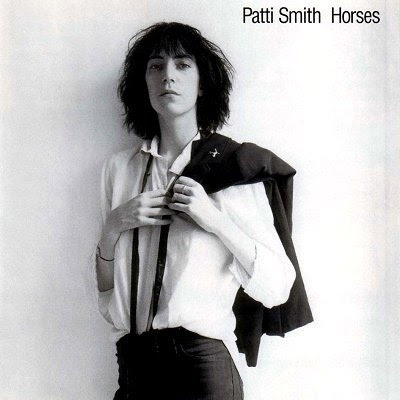‘Jesus died for
somebody’s sins, but not mine’. Thus opens ‘Gloria’, the opening track from
Patti Smith’s seminal debut album Horses.
The track itself is actually a cover of a Van Morrison song, originally written
for Them, but Smith recreates it – including a reinvention of lyrics to include
said opening line – in such an idiosyncratic manner that the song sits quite
happily among the rest of the album, well-disguised as a Smith original.
But idiosyncrasy was always one of the main objectives of
the then-budding punk movement; a fact which was somewhat forgotten by the
better-known English bands after the original rush of ’77. Smith used the lyric
as a method of rebellion against the institutionalized religion she felt had
been forced upon her; the three-chord progression was the style which came to
be known as the ‘punk style’, sure, but by the time the likes of the Sex
Pistols attempted to see commercial success past the surprising success of Never Mind The Bollocks, their attempts
fell flat – not so much, I believe, due to the lack of another full-length, but
more so because the style had had its 15 minutes.
So when the Pistols came stateside, performing just down the
road from Patti Smith one night and frontman John ‘Rotten’ Lydon talked about ‘some
woman singing about fuckin’ horses’ (or words to that effect), it was evident
that they had lost touch with the roots of the movement. The diversity in Smith’s
influences is evident throughout this album – for instance, second track ‘Redondo
Beach’ takes a bouncy approach akin to reggae, predating ska punk by several
years, whereas the first 9-minute epic of the album, ‘Birdland’, is loosely
based around a piano ballad throughout.
When she actually becomes violently passionate during a
song, therefore, it comes as quite a surprise – the first chorus to ‘Free Money’
comes out of seemingly nowhere, as does the vocal attack when past the
introduction to ‘Land’, which for all intents and purposes is the title track.
The point is this; although the instrumentation is interesting, sure, the focal
point of this album is Smith’s outstanding vocal performance – one which has
not since been paralleled in popular music.
This performance demonstrates quite capability the sheer
range of Smith’s vocal styles – although upon one’s first listen to the album,
one might remember the ‘monkey noises’ during the chorus of ‘Gloria’ and Smith’s
tendency to take her pitch sharply upwards at the ends of vocal lines, but
equally memorable upon repeated listens are the cavernous vocals utilised in ‘Land’
and the percussive approach used in many verses, which really aids in the
appreciation of the quality of the timbre of her voice.
In essence, the variation in this album means that the
post-punk genre is here before much of the groundwork of punk itself had been
laid down. It may seem strange, a ‘post-‘ genre being spawned before its suffix
was fully created, but that is the only way to demonstrate aptly the full level
of innovation of this album. This album was, and is, one of a kind. Patti Smith
did indeed go on to make more wonderful music with the likes of Radio Ethiopia, but this is by a long
shot her best. An absolutely wonderful album.
9/10


No comments:
Post a Comment